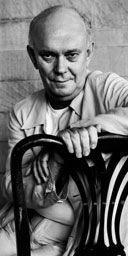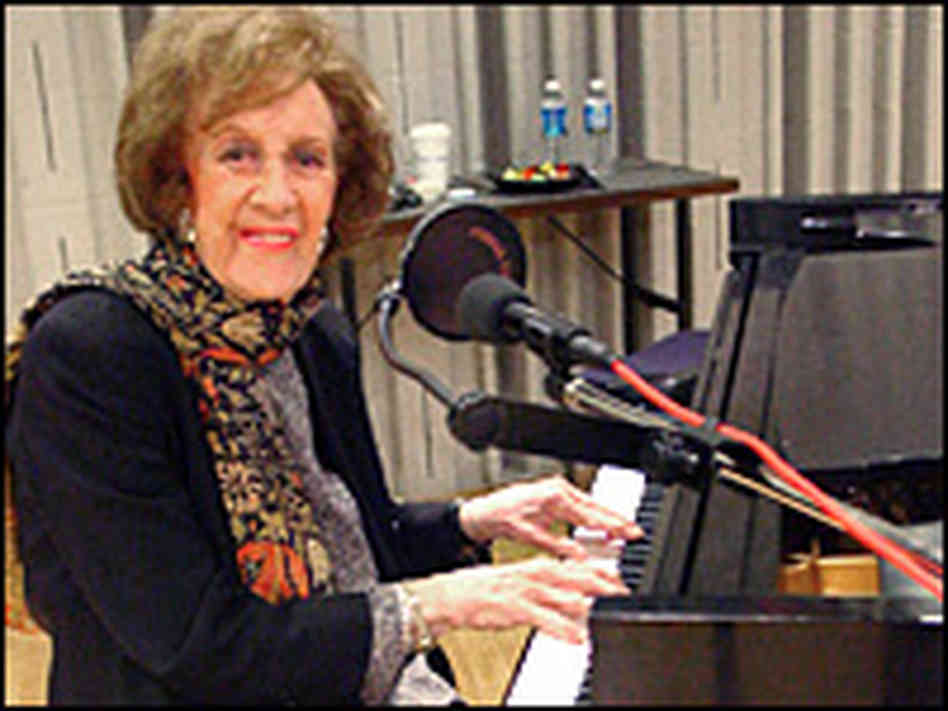“It’s difficult to accept what your psyche or history dooms you to write, what Faulkner would call your postage stamp of reality. Young writers often mistakenly choose a certain vein or style based on who they want to be, unconsciously trying to blot out who they actually are. You want to escape yourself.”
Mary Karr, interview, The Paris Review (Winter 2009)
Archives for 2013
TT: Just because
Courtesy of Maria Popova, Alfred Hitchcock talks about happiness:
(This is the latest in a series of arts-related videos that appear in this space each Monday and Wednesday.)
TT: Almanac
“When you’re a young writer, you just want someone to look at you and say, She’s a poet. It feels like being called a mermaid or a griffin or something.”
Mary Karr, interview, The Paris Review (Winter 2009)
TT: For summertime, a chilly comedy
In today’s Wall Street Journal I report on two shows, a first-class regional revival of Absurd Person Singular and the Broadway premiere of a wretchedly bad new musical, Soul Doctor. Here’s an excerpt.
* * *
When a playwright is as prolific as Alan Ayckbourn, it doesn’t make much sense to single out any of his shows as “the best.” It’s true, though, that “Absurd Person Singular,” first seen in London in 1973 and on Broadway the following year, put Mr. Ayckbourn on the international map, and of all his 77 plays, it might well be the one that sums him up most completely, in tone no less than technique. Like many of his plays, “Absurd Person Singular” is so funny that you can easily overlook its darkness, but the Peterborough Players’ production, outstandingly well directed by Gus Kaikkonen, balances these two aspects with exhilarating exactitude.
 The three acts of “Absurd Person Singular” take place on successive Christmases and the characters are three unhappily married couples (plus a fourth couple that is never seen onstage, a favorite Ayckbourn trick). Their lives are messy and getting messier, and by play’s end their complicated relationships have all been turned inside out. On paper this sounds like the stuff of farce, and “Absurd Person Singular” is for much of its length a farrago of comic craziness, but there’s nothing amusing about the ultimate fates of the author’s unfortunate characters. The only one who winds up happy, if you want to call it that, is the one who proves in the end to be heartless.
The three acts of “Absurd Person Singular” take place on successive Christmases and the characters are three unhappily married couples (plus a fourth couple that is never seen onstage, a favorite Ayckbourn trick). Their lives are messy and getting messier, and by play’s end their complicated relationships have all been turned inside out. On paper this sounds like the stuff of farce, and “Absurd Person Singular” is for much of its length a farrago of comic craziness, but there’s nothing amusing about the ultimate fates of the author’s unfortunate characters. The only one who winds up happy, if you want to call it that, is the one who proves in the end to be heartless.
I’ve seen two previous revivals of “Absurd Person Singular,” one on Broadway in 2005 and one at Massachusetts’ Barrington Stage in 2010. Both were very well acted but not quite so well staged. This one, by contrast, succeeds on both counts. Mr. Kaikkonen, who directed the Mint Theatre Company’s important Off-Broadway revival of N.C. Hunter’s “A Picture of Autumn” earlier this summer, manages the play’s whirling physical comedy with impressive skill. At the same time, though, he italicizes the discomfort of Mr. Ayckbourn’s characters…
Moving from best to worst, we come to “Soul Doctor,” a how-the-hell-did-this-junker-ever-get-to-Broadway musical that ranks very close to the top of my list of unforgettably awful shows. The subtitle, “Journey of a Rockstar Rabbi,” tells part of the story, sort of: Shlomo Carlebach (Eric Anderson) was a folk-singing, guitar-strumming rabbi from Berlin who befriended Nina Simone (Amber Iman, who has superior pipes) and hung out with the likes of Bob Dylan and Pete Seeger in Greenwich Village. While his life is fascinating, his hippy-dippy can-we-all-just-get-along songs were and are insipid in the extreme, and “Soul Doctor,” whose book is by Daniel S. Wise, recounts Carlebach’s tale in kindergarten-pageant style…
* * *
Read the whole thing here.
TT: Almanac
“The curtain goes up, the lights come on, you’re in a room with three walls, and there they are, these servants of art, and all they do is show us how people eat, drink, make love, walk, and wear clothes! And then they try to draw some kind of moral, some nice easy kind of moral, something you wouldn’t mind having around the house. You go, they give you the same stuff over and over an over…and it makes me sick!”
Anton Chekhov, The Seagull (trans. Paul Schmidt)
TT: So you want to see a show?
Here’s my list of recommended Broadway, off-Broadway, and out-of-town shows, updated weekly. In all cases, I gave these shows favorable reviews (if sometimes qualifiedly so) in The Wall Street Journal when they opened. For more information, click on the title.
BROADWAY:
• Annie (musical, G, reviewed here)
• Matilda (musical, G, all performances sold out last week, reviewed here)
• Once (musical, G/PG-13, nearly all performances sold out last week, reviewed here)
• The Trip to Bountiful (drama, G, closes Oct. 9, reviewed here)
OFF BROADWAY:
• Avenue Q (musical, R, adult subject matter and one show-stopping scene of puppet-on-puppet sex, reviewed here)
• The Fantasticks (musical, G, suitable for children capable of enjoying a love story, reviewed here)
IN NIAGARA-ON-THE-LAKE, ONTARIO:
• Faith Healer (drama, PG-13, closes Oct. 6, reviewed here)
• Major Barbara (drama, PG-13, closes Oct. 19, reviewed here)
• Our Betters (comedy, PG-13, closes Oct. 27, reviewed here)
IN ASHLAND, OREGON:
• My Fair Lady (musical, G, closes Nov. 3, reviewed here)
CLOSING SOON OFF BROADWAY:
• The Weir (drama, PG-13, extended through Sept. 15, reviewed here)
CLOSING NEXT WEEK IN GARRISON, N.Y.:
• All’s Well That Ends Well (Shakespeare, PG-13, closes Aug. 30, reviewed here)
• King Lear (Shakespeare, PG-13, closes Aug. 31, reviewed here)
CLOSING SUNDAY IN CHICAGO:
• Big Lake Big City (comedy, PG-13/R, completely unsuitable for children, reviewed here)
CLOSING SUNDAY ON BROADWAY:
• Vanya and Sonia and Masha and Spike (comedy, PG-13, remounting of off-Broadway production, nearly all performances sold out last week, original production reviewed here)
TT: Almanac
“‘We belong to all countries’–that is from Montaigne, but while saying that he was very glad to be in his own home.”
Mme. de Sévigné, letter to Mme. de Grignan, Apr. 6, 1672 (courtesy of Rick Brookhiser)
TT: Marian McPartland, R.I.P.
I first heard Marian McPartland play in person at the Women’s Jazz Festival in Kansas City. That was, if memory serves, in 1979, back when she was working with Brian Torff, and I confess with some retrospective embarrassment that it was his fleet-fingered bass solos, not her harmonically iridescent pianism, that excited me most. Yet I understood at once that she was an artist of unusual quality, and I can still hear in my mind’s ear the shining simplicity with which she played Johnny Mandel’s “Emily” that night. When she and Torff started recording together for Concord Jazz, I began to listen more attentively to her playing, and soon came to understand how remarkable it was.
 In those days, needless to say, it never occurred to me that I would ever meet so celebrated a musician, but in 1998, after I moved to New York, I drove out to her Long Island home to interview Marian for a profile that appeared in the New York Times on the occasion of her eightieth birthday. She told me that she liked the piece, which delighted me beyond words. I like to think that it captured something of her distinctive personality, at once reserved and forthright:
In those days, needless to say, it never occurred to me that I would ever meet so celebrated a musician, but in 1998, after I moved to New York, I drove out to her Long Island home to interview Marian for a profile that appeared in the New York Times on the occasion of her eightieth birthday. She told me that she liked the piece, which delighted me beyond words. I like to think that it captured something of her distinctive personality, at once reserved and forthright:
It is hard not to wonder whether Ms. McPartland’s modesty about her accomplishments arises in part from the fact that she is a woman who has made her way in what for a very long time was almost exclusively a man’s world. This diffidence stands in surprising contrast to the bright clarity of her piano playing, which grows more harmonically adventurous with each passing year. ”I’ve become a bit more–reckless, maybe,” she says. ”I’m getting to the point where I can smash down a chord and not know what it’s going to be, and make it work. And though I’ll never swing like Mary Lou Williams, I’m better at it than I used to be.”
Later that year Marian asked me to write the liner notes for one of her albums, and from then on I felt that I could claim acquaintance with her. We were never remotely close, alas: I found her a bit intimidating, and the great gap of years that separated us made it impossible for me to reach out to her other than sporadically. I did encourage Marian on more than one occasion to write a memoir–she was a very good writer–but got nowhere. She told me that she preferred to spend her time and energy playing piano, not writing, and I couldn’t argue with that, especially since she was still playing wonderfully well. By then arthritis had shaved away the sharp edge of her technique, but her ear was as keen as ever, and even at their least agile, her solos were always worth hearing.
Today I suppose she’s best known for Piano Jazz, which she hosted for NPR from 1978 to 2011. She proved to be an extraordinarily deft interviewer, and the program was a singular contribution to jazz history. But it is as a performer, not a radio personality, that Marian will be remembered longest. I suppose she inhabited a tier just below the indisputable greats–that’s what she herself would undoubtedly have said–but there was never a time when her playing was anything other than individual and satisfying. Her passing leaves yet another gap in the skyline of my life. I am honored to have known her.
* * *
Marian McPartland plays her composition “Afterglow” at the Monterey Jazz Festival in 1975:
